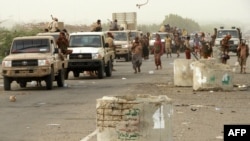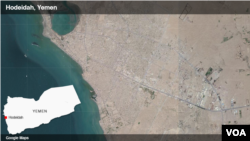U.N. and international aid agencies warn the assault on Yemen's main port of Hodeidah by Saudi-backed government forces threatens the lives of hundreds of thousands of people and puts millions more at risk of starvation and disease.
The port not only imports crucial humanitarian relief supplies, but is also the main entry point for traded commercial goods, according to Filippo Grandi, the U.N. High Commissioner for Refugees.
"This is how Yemen survives. Fuel, food, medicines, at least these three big areas. And I think that fighting will make it more difficult for that access to happen, so that is very worrying," Grandi said. "Military response is aggravating the humanitarian catastrophe of Yemen. This continues to be not the biggest displacement crisis, but the biggest humanitarian crisis of the world. I think this will make it worse."
Monday, the United Nations evacuated its international staff from Hodeidah in anticipation of the attack.
Several days ago, the International Committee of the Red Cross withdrew 71 members of its international staff from Yemen, following threats and the killing of one of its employees. ICRC Regional Director Robert Mardini says the push for Hodeidah is likely to exacerbate an already catastrophic situation in Yemen.
Since March 2015, when the Saudi-led coalition began bombing Houthi rebels in support of the government, more than 10,000 people — mostly civilians — have been killed. The United Nations estimates 22 million people are in need of humanitarian aid, about 8 million face starvation, and outbreaks of diseases are putting countless others at risk of death.
The U.N. children's fund warns that at least 300,000 children who live the Hodeidah area are in imminent danger. In addition, it notes 11 million children throughout the war-torn country are in need of humanitarian aid.
Choking off the lifeline provided by the port of Hodeidah will have devastating consequences for every one of them, the U.N. children's fund says.





